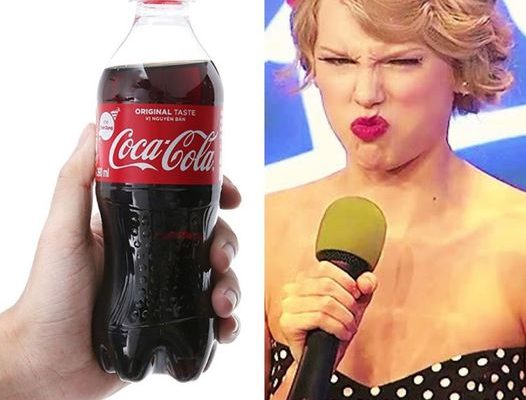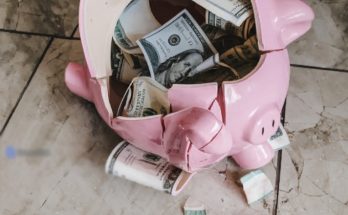Coca-Cola Cuts Ties With Taylor Swift Over Harris Endorsement, “We Don’t Support Her Endorsement”… Full story below![]()

Coca Cola Partnership With Taylor Swift
In a move that has sent shockwaves through both the music and marketing worlds, Coca-Cola has officially ended its long-standing partnership with global pop icon Taylor Swift. The reason? Swift’s very public endorsement of Kamala Harris in the 2024 presidential race, a political stance that Coca-Cola executives say clashes with the brand’s values of “unity and neutrality.”
Swift, who has been the face of Diet Coke campaigns since 2013, is no stranger to setting trends. But her latest endorsement has landed her in hot water with the soft drink giant, which has decided to take a hard stance by cutting ties with the star. Coca-Cola’s leadership, known for its steadfast focus on keeping politics far away from its fizzy empire, found themselves bubbling with concern over the impact of Swift’s newfound political voice.
“We’ve enjoyed a mutually beneficial relationship with Taylor Swift for years, but we cannot support her recent political endorsement,” said a Coca-Cola spokesperson. “Our brand is about refreshing people of all backgrounds, no matter their beliefs. We simply don’t want to mix our product with politics. We sell soda, not platforms.”
The trouble started when Taylor Swift posted an impassioned Instagram message supporting Kamala Harris as the next president of the United States. Calling Harris “the leader we need” and “a true inspiration for women everywhere,” Swift’s post racked up millions of likes and an equal amount of controversy.
For some, it was a sign of Swift using her platform to empower change. For Coca-Cola executives, however, it was a political minefield they had no interest in navigating. The company quickly held emergency meetings to discuss the endorsement’s potential fallout, especially in a country already deeply divided over politics. By the time the executives finished their second round of Diet Cokes, the decision was made: it was time to part ways with their bubbly brand ambassador.
“We respect Taylor’s right to express her opinions,” said the spokesperson. “But as a company that has customers on all sides of the political spectrum, we need to remain neutral. When the message starts to interfere with the product, we have to protect the brand.”
Swift, never one to back down from controversy, responded swiftly (pun intended). Just hours after Coca-Cola’s announcement, she took to social media again, this time with a photo of herself sipping on what appeared to be sparkling water, the caption reading: “I’ll survive without Diet Coke. What I won’t survive without is standing up for what I believe in.”
The message was clear: Taylor Swift wasn’t going to let a corporate breakup stop her from expressing her political views. In true Swift fashion, she managed to turn a potentially damaging scenario into a moment of empowerment, with her fans—known as “Swifties”—flooding social media to show their support.
“Coca-Cola dropping Taylor for speaking her mind? Their loss,” one fan tweeted, alongside a gif of Swift flipping her hair. “She doesn’t need them. She’s bigger than any brand.”
As expected, the internet exploded with reactions. Some fans were outraged, calling for a boycott of Coca-Cola products in protest of the company’s decision to cut ties with Swift. The hashtag #CokeIsCancelled began trending, with Swift’s loyal followers vowing to switch to other beverages and calling out the brand for what they saw as a “corporate overreaction.”
“I’ve been drinking Diet Coke since I was 15, but if they can’t handle Taylor standing up for what’s right, I’ll be switching to LaCroix,” one fan tweeted.
The backlash wasn’t limited to Twitter. Across Instagram, TikTok, and Facebook, Swifties posted videos of themselves pouring cans of Coke down the drain or dramatically replacing Coca-Cola products with other beverages. One viral video even featured a fan holding up a sign reading, “You Can’t Spell ‘Coca-Cola’ Without ‘Cancel’”—a clever dig at the company’s decision to part ways with Swift.
On the flip side, supporters of Coca-Cola’s stance praised the company for avoiding a political quagmire. “Finally, a brand that’s willing to stay out of politics. I’m buying two cases of Coke this weekend,” one commenter posted, signaling that the soda wars had just begun.
While Coca-Cola’s decision to distance itself from Swift might make sense in the short term—avoiding alienating consumers on either side of the political divide—it raises larger questions about the role of corporations in today’s politically charged climate. With celebrities like Taylor Swift using their platforms to push for change, brands are finding it increasingly difficult to remain neutral without getting caught in the crossfire.
Some industry experts are already questioning whether Coca-Cola’s move will backfire in the long run. “Taylor Swift is more than a pop star. She’s a cultural icon with an enormous following, and breaking up with her over a political endorsement could hurt Coca-Cola’s brand image,” said marketing analyst Jamie Caldwell. “They’re betting on political neutrality, but in today’s world, staying neutral can sometimes be the riskiest move of all.”
Caldwell noted that while some consumers appreciate Coca-Cola’s apolitical stance, others may see it as a missed opportunity to align with progressive values—especially with younger, more socially conscious generations driving much of today’s consumer spending.
Coca-Cola’s decision to cut ties with Swift has left other brands watching closely, wondering whether they’ll have to make a similar choice. Companies like Nike, Apple, and L’Oréal, which have also partnered with Swift, are reportedly re-evaluating their own strategies.
While some may choose to follow Coca-Cola’s lead and avoid political entanglements, others may double down on their support for Swift, seeing her political engagement as a reflection of their own brand values. It’s a delicate balancing act in an era where corporations are often pressured to take a stand on social and political issues.
One thing’s for sure: Taylor Swift isn’t likely to shy away from her newfound political voice, and her corporate partners will have to decide whether they’re willing to ride that wave with her or stay safely on the sidelines.
While losing a long-term partner like Coca-Cola might sting, Taylor Swift is unlikely to slow down. If anything, this corporate breakup may fuel her next chapter—whether that means finding a brand that’s more aligned with her values or launching her own line of socially conscious beverages.
Fans are already speculating about what could be next for the star, with some suggesting that Swift could pivot toward a partnership with eco-friendly or socially progressive brands. Others believe she might go a step further and create her own brand—perhaps “Swift Sparkle,” a politically charged, refreshing drink that quenches both thirst and the desire for social change.
No matter what Swift’s next move is, one thing is clear: her decision to speak out on politics may have ended one partnership, but it’s certainly not the end of her influence.






